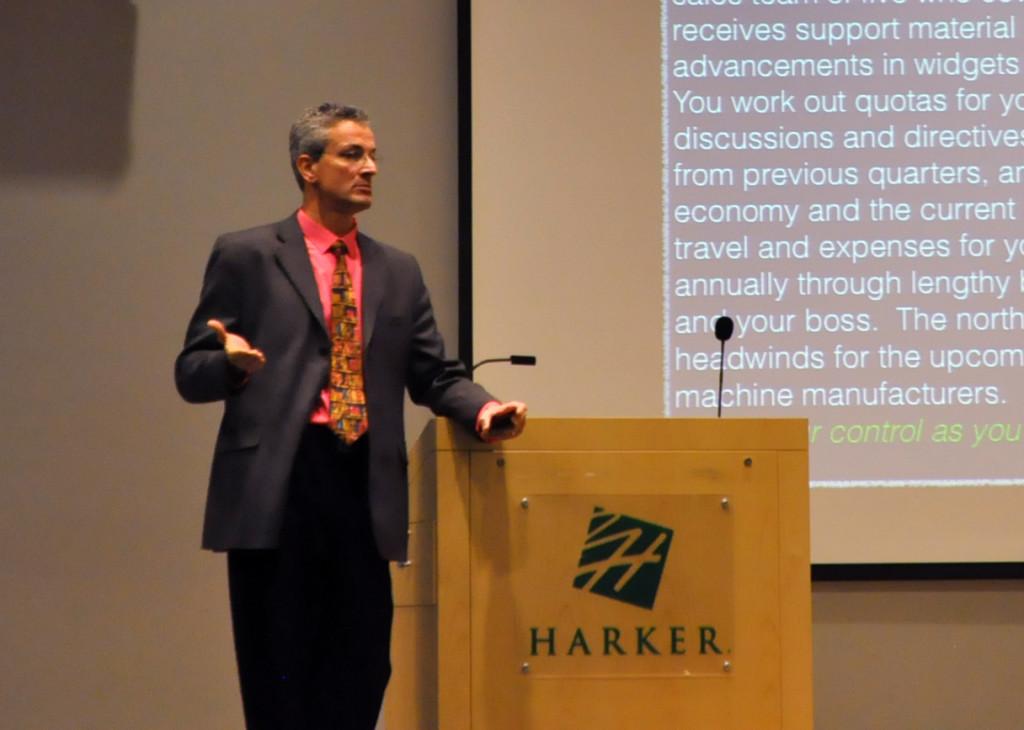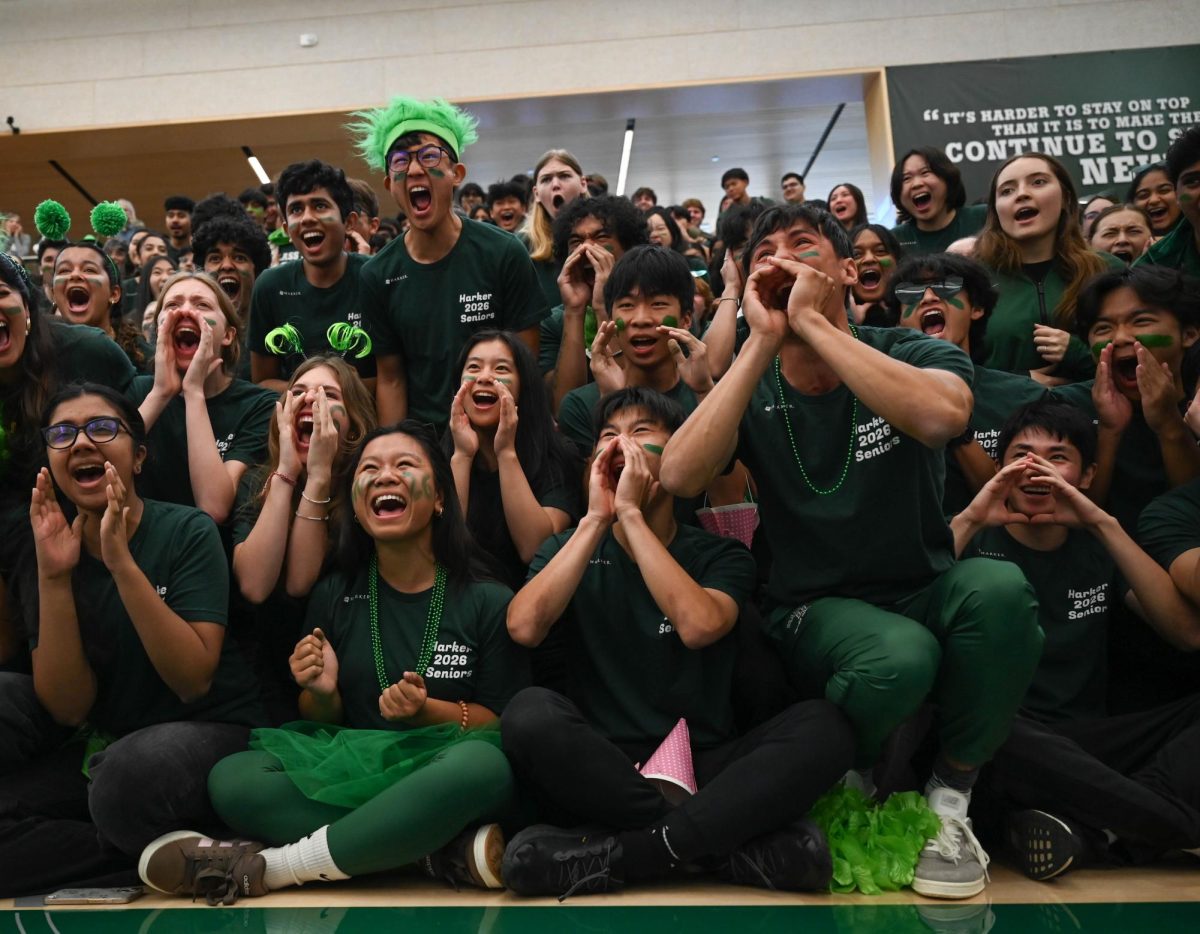Head of School Christopher Nikoloff began his annual four part lecture series on January 16 with a talk on leadership and the “release” aspect of Taoism, based on the book Tao Te Ching.
The one-hour talk was broken into four parts, each of which was posed as a question to encourage participation from the students and faculty who attended. The main questions in his lecture included: “What is Tao?” “What do I control?” and “What are the two types of leadership?”
“The fact that he stopped a lot and asked for feedback really solidified my understanding and made me think more,” Carlos Cruz-Johnson (12) said.
The “What is Tao?” section examined Taoism, a religion based on the teaching of Lao Zi. Although Tao Te Ching was written 2500 years ago, Nikoloff tied it into today’s idea of leadership. According to Nikoloff, Taoism means following the path and relinquishing some level of control. Taoist beliefs dictate that there is no set path to follow and that by attempting to understand Tao, one is already breaking it.
Next, he moved onto the idea of control and if a lack of control is optimal in certain situations. Using a case study about a business company, he pointed out that some factors may be out of our control and Taoism teaches people to embrace the level of uncertainty.
“We end up creating more problems by trying to fix things than the actual original problem,” Nikoloff said. “That doesn’t mean go back and do nothing. However, think about whether the solution is worse than the problem.”
The bulk of his lecture analyzed the two types of leadership, sparking discussion among the group of attendees. The characteristics of the Napoleonic style of leadership, knowledge, charisma, and authority, are typically what come to most people’s minds when thinking of a leader. The Tao style of leadership is more hands-off, aligning with the aspect of relinquishing some level of control. This style of leadership is portrayed by passages from Tao Te Ching such as “the more weapons you have, the less secure people will be”, a seemingly oxymoronic statement.
Nikoloff concluded with an examination of the exceptions to this style of leadership and encouraged the listeners to challenge the ideas he had presented.
According to Nikoloff, the lecture was not meant to advocate Tao beliefs or a certain style of leadership but rather to explore the multiple facets of leadership.
Freshman Alyssa Crawford thought that the lecture was thought provoking and tied back into her own life.
“I am the type of person who tries to micro-manage and I’ve found that all that leads to is frustration,” she said. “If the leader does nothing, then they are not a leader.”
The next lecture series focuses on selflessness in leadership and will take place during a future long lunch, the date of which is yet to be determined.




![LALC Vice President of External Affairs Raeanne Li (11) explains the International Phonetic Alphabet to attendees. "We decided to have more fun topics this year instead of just talking about the same things every year so our older members can also [enjoy],” Raeanne said.](https://harkeraquila.com/wp-content/uploads/2025/10/DSC_4627-1200x795.jpg)


















![“[Building nerf blasters] became this outlet of creativity for me that hasn't been matched by anything else. The process [of] making a build complete to your desire is such a painstakingly difficult process, but I've had to learn from [the skills needed from] soldering to proper painting. There's so many different options for everything, if you think about it, it exists. The best part is [that] if it doesn't exist, you can build it yourself," Ishaan Parate said.](https://harkeraquila.com/wp-content/uploads/2022/08/DSC_8149-900x604.jpg)




![“When I came into high school, I was ready to be a follower. But DECA was a game changer for me. It helped me overcome my fear of public speaking, and it's played such a major role in who I've become today. To be able to successfully lead a chapter of 150 students, an officer team and be one of the upperclassmen I once really admired is something I'm [really] proud of,” Anvitha Tummala ('21) said.](https://harkeraquila.com/wp-content/uploads/2021/07/Screen-Shot-2021-07-25-at-9.50.05-AM-900x594.png)







![“I think getting up in the morning and having a sense of purpose [is exciting]. I think without a certain amount of drive, life is kind of obsolete and mundane, and I think having that every single day is what makes each day unique and kind of makes life exciting,” Neymika Jain (12) said.](https://harkeraquila.com/wp-content/uploads/2017/06/Screen-Shot-2017-06-03-at-4.54.16-PM.png)








![“My slogan is ‘slow feet, don’t eat, and I’m hungry.’ You need to run fast to get where you are–you aren't going to get those championships if you aren't fast,” Angel Cervantes (12) said. “I want to do well in school on my tests and in track and win championships for my team. I live by that, [and] I can do that anywhere: in the classroom or on the field.”](https://harkeraquila.com/wp-content/uploads/2018/06/DSC5146-900x601.jpg)
![“[Volleyball has] taught me how to fall correctly, and another thing it taught is that you don’t have to be the best at something to be good at it. If you just hit the ball in a smart way, then it still scores points and you’re good at it. You could be a background player and still make a much bigger impact on the team than you would think,” Anya Gert (’20) said.](https://harkeraquila.com/wp-content/uploads/2020/06/AnnaGert_JinTuan_HoHPhotoEdited-600x900.jpeg)

![“I'm not nearly there yet, but [my confidence has] definitely been getting better since I was pretty shy and timid coming into Harker my freshman year. I know that there's a lot of people that are really confident in what they do, and I really admire them. Everyone's so driven and that has really pushed me to kind of try to find my own place in high school and be more confident,” Alyssa Huang (’20) said.](https://harkeraquila.com/wp-content/uploads/2020/06/AlyssaHuang_EmilyChen_HoHPhoto-900x749.jpeg)










